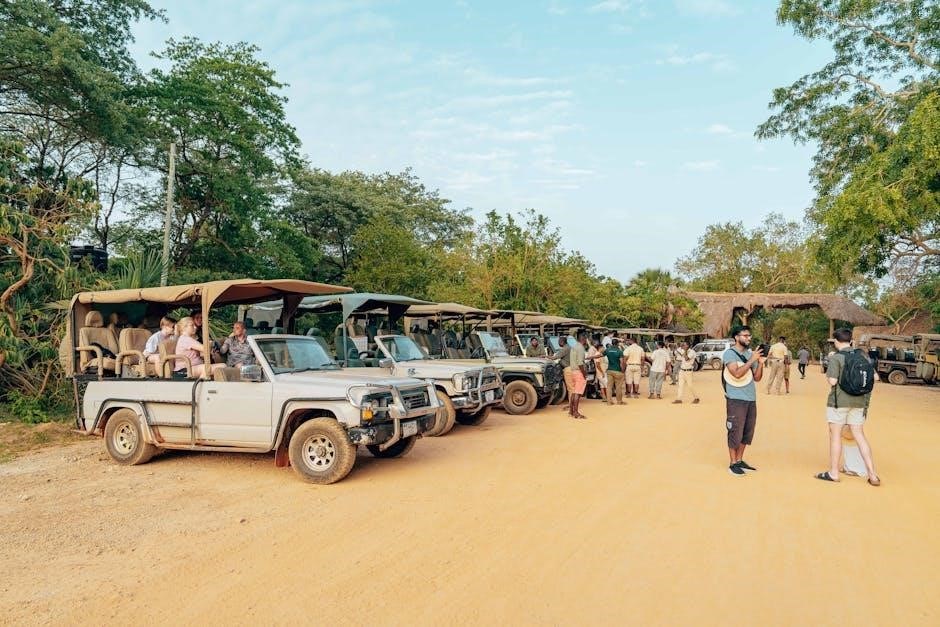tour guide safari
A safari tour guide is an expert who leads travelers through wildlife adventures, ensuring safety, providing educational insights, and creating unforgettable experiences in nature reserves and national parks.
Overview of Safari Tourism
Safari tourism is a growing adventure-based travel experience, offering immersive exploration of wildlife and natural landscapes. It attracts nature enthusiasts, photographers, and travelers seeking unique experiences. Safari tours often take place in Africa, Asia, and other regions with diverse ecosystems. The goal is to observe animals in their natural habitats while promoting conservation and sustainability. Tourists typically engage in guided drives, walks, or camping trips, led by experienced guides. Safari tourism has gained popularity due to increasing interest in ecotourism and cultural experiences. It also supports local economies and conservation efforts. Professional guides play a crucial role in ensuring safe, educational, and unforgettable adventures, balancing excitement with environmental respect.
Role of a Safari Tour Guide
A safari tour guide serves as an expert leader, educator, and safety manager during wildlife adventures. Their primary role is to ensure a safe and informative experience for tourists. Guides possess deep knowledge of local flora, fauna, and ecosystems, sharing insights to enhance understanding and appreciation. They are responsible for tracking wildlife, navigating terrains, and interpreting animal behaviors. Additionally, guides manage logistics, handle emergencies, and foster a connection between visitors and the environment. Their expertise and passion create memorable experiences, making them indispensable to the success of safari tours. Effective communication and problem-solving skills are key, ensuring both safety and enjoyment for all participants.
Key Responsibilities of a Safari Tour Guide
Safari tour guides are responsible for ensuring a safe and educational experience for tourists. They provide insights into wildlife behavior and ecosystems, manage expectations, and handle emergencies. Guides also navigate terrains, track animals, and maintain group safety while fostering a connection with nature. Their role includes logistics coordination, such as transportation and accommodations, ensuring a seamless adventure for all participants.
Ensuring Safety During the Safari
Safari tour guides prioritize safety to protect both tourists and wildlife. They conduct thorough safety briefings, ensuring everyone understands protocols for encountering animals. Guides are trained in first aid and emergency response, carrying essential equipment like radios and medical kits. They maintain a safe distance from wildlife to avoid provoking animals. Guides also assess terrain risks, avoiding hazardous areas, and ensure vehicles are equipped with safety features. By staying alert and prepared, they minimize potential dangers, ensuring a secure and enjoyable experience for all participants while fostering respect for nature and wildlife conservation efforts.
Providing Educational Insights
Safari tour guides play a crucial role in educating tourists about wildlife, ecosystems, and conservation efforts. They share detailed knowledge about animal behavior, habitats, and unique characteristics, enriching the safari experience. Guides often explain the importance of preserving natural environments and the impact of human activities on wildlife. They also provide insights into local cultures and historical contexts, offering a holistic understanding of the region. By sharing fascinating facts and anecdotes, guides transform the safari into an informative and engaging learning experience, fostering appreciation and respect for nature and wildlife conservation. Their expertise ensures that tourists gain valuable knowledge while enjoying their adventure.
Managing Tourist Expectations
Managing tourist expectations is a critical aspect of a safari tour guide’s role. Guides ensure that visitors have a clear understanding of what to anticipate during the tour, balancing excitement with realism. They communicate the possibilities of spotting specific wildlife while emphasizing the unpredictability of nature. By setting realistic expectations, guides help tourists avoid disappointment and enhance their overall experience. This involves addressing concerns, explaining safety protocols, and adapting to diverse interests and physical capabilities. Effective communication and empathy are key in aligning expectations with the realities of the safari adventure, ensuring that tourists remain engaged and satisfied throughout their journey. This approach fosters a positive and memorable experience for all participants.
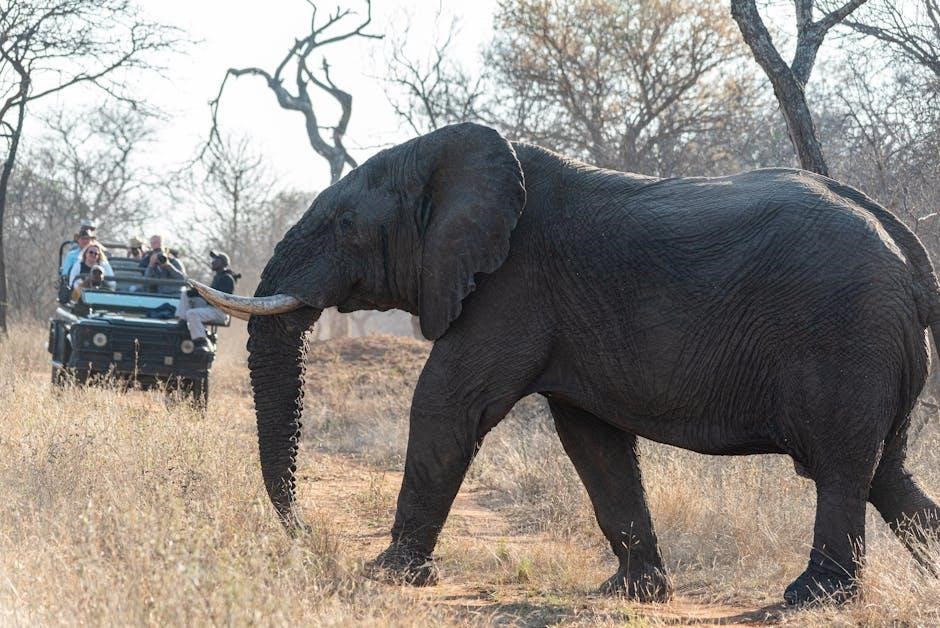
Essential Qualities of a Successful Safari Guide
A successful safari guide must possess deep wildlife knowledge, excellent communication skills, and physical stamina. Adaptability, patience, and a genuine passion for nature are equally vital for ensuring memorable experiences.
Knowledge of Wildlife and Ecosystems
A successful safari guide must have extensive knowledge of local wildlife, including animal behavior, habitats, and species identification. Understanding ecosystems ensures guides can explain how plants and animals interact. Recognizing tracks, calls, and signs allows them to locate and identify wildlife effectively. Guides should also be familiar with conservation efforts and environmental challenges. This expertise enhances the educational value of the tour, enabling guides to share fascinating insights about biodiversity. Knowledge of seasonal changes and migration patterns is crucial for predicting wildlife movements. By combining practical experience with theoretical understanding, guides create engaging and informative experiences for tourists while fostering appreciation for nature and conservation efforts.
Strong Communication Skills
Effective communication is vital for safari tour guides to ensure a memorable and informative experience. Guides must articulate wildlife facts, cultural insights, and safety instructions clearly and engagingly. Strong verbal skills help in storytelling, making the tour educational and entertaining. Active listening is equally important to address tourist questions and concerns. Guides should also be adept at adapting their communication style to diverse audiences, including international visitors with varying languages and cultural backgrounds. Clear and concise explanations foster better understanding and engagement. Additionally, guides must be able to convey enthusiasm and passion for wildlife, inspiring a deeper appreciation for nature among tourists. Excellent communication skills transform a safari into a rich, immersive, and unforgettable journey;
Physical and Mental Stamina
Safari tour guides require exceptional physical and mental stamina to navigate challenging terrains, handle unpredictable weather conditions, and manage long, demanding schedules. Guides must be in good physical shape to endure hours of walking, hiking, or driving in remote areas. Mental resilience is equally important, as they must remain composed under pressure, especially during emergencies or unexpected situations. The ability to multitask, think critically, and maintain focus over extended periods ensures the safety and enjoyment of tourists. Stamina also enables guides to adapt to diverse environments and maintain high energy levels throughout the tour. These qualities are essential for delivering a seamless and enriching safari experience.
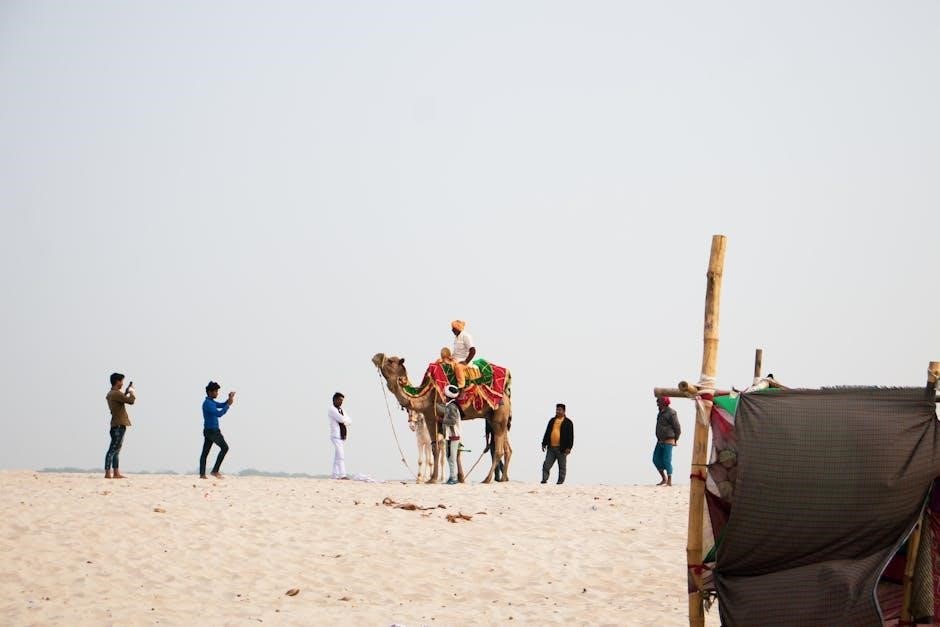
Planning a Safari Tour
Planning a safari tour involves researching destinations, budgeting, and timing to align with wildlife seasons and weather conditions, ensuring a well-organized and memorable adventure.
Choosing the Right Destination
Choosing the right destination for a safari tour is crucial for a memorable experience. Research regions known for abundant wildlife, such as African savannas or Asian jungles. Consider seasons, as wildlife activity varies with weather patterns. Popular destinations include Kenya’s Maasai Mara, Tanzania’s Serengeti, and South Africa’s Kruger National Park. Each offers unique landscapes and wildlife encounters. For instance, Africa is renowned for the Big Five, while India is a hotspot for tiger sightings. Evaluate the accessibility and safety of the location, ensuring it aligns with your budget and preferences. Consulting with local guides or tour operators can provide valuable insights. Selecting the right destination sets the foundation for an unforgettable safari adventure.
Creating an Itinerary
Creating a detailed itinerary is essential for a well-organized safari tour. Start by outlining the duration of the trip and the key activities for each day. Include arrival and departure times, game drives, meal breaks, and rest periods. Consider the travel time between locations and ensure a balance between exploration and relaxation. Highlight must-see attractions and activities, such as birdwatching or cultural visits to local communities. Allow flexibility in the schedule to adapt to unexpected wildlife sightings or weather changes. Ensure the itinerary prioritizes safety, comfort, and the group’s preferences. A well-planned itinerary enhances the safari experience, making it memorable and stress-free for tourists. Tailor the plan to align with the group’s interests and physical capabilities, ensuring everyone enjoys the adventure.
Packing Essentials for a Safari
When preparing for a safari, it’s crucial to pack essentials that ensure comfort, safety, and readiness for wildlife adventures. Binoculars are a must for spotting distant animals, while comfortable, neutral-colored clothing helps blend in with the environment. Sun protection, including a hat and high SPF sunscreen, is vital for outdoor exploration. Insect repellent will guard against mosquitoes and other bugs, and a first-aid kit is essential for minor injuries. Bring a reusable water bottle to stay hydrated and a camera with a zoom lens to capture memories. Sturdy footwear and a flashlight or headlamp are also necessary for navigating terrain and evening activities. Don’t forget a lightweight rain jacket and travel document holder for important papers. A portable power bank ensures your devices remain charged, while practical, lightweight gear enhances the safari experience.

Safety Protocols for Safari Tours
Safety is paramount on safari tours. Guides ensure adherence to wildlife safety tips, preparedness for emergencies, and first aid availability, minimizing risks for all participants.
Emergency Preparedness
Safari tour guides must be well-prepared for emergencies, such as injuries or sudden illnesses. They are trained in first aid and carry essential medical kits. Guides also maintain communication devices to call for help in remote areas. Knowledge of evacuation routes and emergency shelters is critical. Additionally, they stay informed about weather conditions and wildlife behavior to anticipate potential risks. Guides ensure vehicles are equipped with emergency supplies, such as water, food, and navigation tools. Mental stamina and quick decision-making are vital to handle crises effectively, ensuring the safety and well-being of all participants during the safari adventure.
Wildlife Safety Tips
When on a safari, maintaining a safe distance from wildlife is crucial. Never approach or feed animals, as this can provoke them. Stay inside the vehicle and follow the guide’s instructions. Keep noise levels low to avoid startling animals, and avoid sudden movements. Be aware of your surroundings and keep children close. Respect wildlife boundaries and never attempt to touch or pet animals. Follow park rules and guidelines provided by your guide. Remember, wildlife is unpredictable, so staying vigilant and adhering to safety protocols ensures a safe and enjoyable experience for everyone. Always prioritize caution and listen to your guide’s expertise to minimize risks during the safari adventure.
First Aid and Medical Emergencies
During a safari, it’s essential to be prepared for medical emergencies. Guides are trained in first aid and carry essential kits to handle minor injuries, such as cuts or sprains. In case of severe incidents like allergic reactions or snake bites, immediate action is crucial. Communication devices are used to call for emergency evacuations if needed. Guides also ensure that tourists with pre-existing conditions carry necessary medications. Regular checks on health and hydration are conducted to prevent issues like heatstroke. Knowledge of basic first aid and emergency protocols helps guides manage situations effectively, ensuring the safety and well-being of all participants throughout the safari adventure.
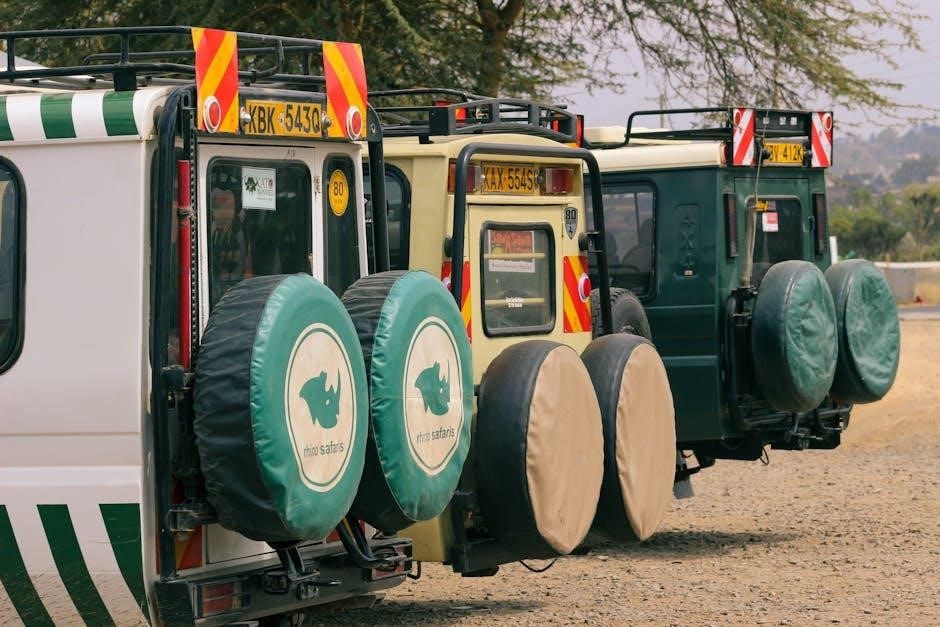
Engaging with Tourists
Safari tour guides foster meaningful connections by sharing insights, encouraging interaction, and ensuring a safe, memorable experience, creating a bond that enhances the adventure and understanding of wildlife.
Building Rapport with Clients
Building rapport with clients is crucial for a safari tour guide, fostering trust and enhancing the overall experience. Effective communication, active listening, and empathy help guides understand client needs and preferences, ensuring personalized interactions. By sharing stories, cultural insights, and wildlife knowledge, guides create a connection that goes beyond the tour. Transparency about safety, expectations, and challenges also strengthens trust. Encouraging questions and open dialogue makes clients feel valued, while maintaining a positive and approachable demeanor ensures a comfortable environment. These efforts not only enrich the safari adventure but also leave lasting impressions, fostering loyalty and positive reviews.
Sharing Cultural and Historical Insights
Sharing cultural and historical insights enriches the safari experience, connecting tourists with the local heritage. Guides highlight traditional practices, historical sites, and the significance of wildlife in indigenous cultures. By recounting stories and explaining cultural symbols, they foster a deeper appreciation for the region’s identity. This storytelling bridges the gap between modern tourism and ancient traditions, making the safari a holistic journey of discovery. Cultural insights also help tourists understand conservation efforts, fostering respect for the land and its inhabitants. Through shared knowledge, guides create a meaningful connection, transforming the safari into an educational and culturally immersive adventure that lingers in travelers’ memories long after the trip ends.
Organizing Interactive Activities
Organizing interactive activities enhances the safari experience, engaging tourists in hands-on experiences that foster deeper connections with nature and culture. Guides often arrange game drives, walking tours, or bird-watching sessions, allowing participants to actively explore the surroundings. Interactive workshops, such as wildlife identification or bushcraft lessons, educate tourists while keeping them entertained. Cultural exchanges, like traditional dance performances or local craft-making sessions, provide insight into indigenous traditions. These activities not only make the safari memorable but also encourage learning and participation; By tailoring experiences to diverse interests, guides ensure that every tourist, from adventure seekers to nature enthusiasts, finds something engaging and meaningful during their journey. This approach transforms the safari into an immersive adventure that goes beyond observation.
Logistics and Coordination
Effective logistics and coordination ensure seamless safari experiences, including planning itineraries, arranging transportation, and managing resources to meet diverse tourist needs efficiently.
Transportation Arrangements
Transportation arrangements are a key aspect of safari logistics, ensuring smooth transitions between destinations. Safari tour guides often coordinate with trusted operators to provide reliable vehicles, such as 4×4 jeeps or safari trucks, designed for rough terrain. These vehicles are typically equipped with open tops for unobstructed wildlife viewing and may include amenities like binocular holders or storage for essentials. Experienced drivers, often doubling as guides, are well-versed in navigating challenging landscapes and spotting wildlife. Proper planning includes confirming pickup and drop-off points, scheduling transfers, and ensuring vehicles are maintained for remote-area reliability. Guides also consider the physical needs of tourists, such as comfort during long drives, and may arrange private charters for larger groups to enhance flexibility and convenience.
Accommodation Options
Accommodation options for safari tours are carefully selected to enhance the wildlife experience while ensuring comfort and safety. Safari tour guides collaborate with lodges, camps, and eco-resorts to offer a range of choices, from luxury tented camps to budget-friendly guesthouses. These accommodations often feature amenities like en-suite bathrooms, dining areas, and scenic views of the surrounding landscape. Many safari lodges are designed to blend seamlessly into the natural environment, promoting an immersive experience. Guides ensure that bookings align with tourists’ preferences, budgets, and the safari itinerary. They also verify that accommodations meet safety standards and are strategically located for easy access to wildlife reserves and key attractions, ensuring a seamless and enjoyable stay for all participants.
Food and Beverage Management
Food and beverage management is a critical aspect of safari tours, ensuring that meals are nutritious, flavorful, and tailored to diverse dietary needs. Safari tour guides often collaborate with chefs and lodge staff to prepare hearty, locally-inspired dishes using fresh ingredients. Many safaris offer bush dining experiences, where meals are served in the wilderness, enhancing the immersive nature of the tour. Guides also handle special dietary requests, such as vegetarian or gluten-free options, to ensure all participants enjoy their meals. Additionally, they manage beverage supplies, including water, juices, and teas, to keep tourists hydrated throughout the day. This attention to detail ensures that the culinary experience complements the adventure, creating a memorable safari journey.

Marketing and Promoting Safari Tours
Effective marketing strategies, such as online campaigns, social media engagement, and customer testimonials, are essential to attract travelers and promote safari tours successfully.
Online Marketing Strategies
Effective online marketing strategies are crucial for promoting safari tours. SEO optimization ensures your website ranks higher in search results, attracting potential clients. Social media platforms like Instagram and Facebook can showcase stunning visuals of wildlife, creating engagement. Google Ads targeting specific keywords helps reach travelers planning safaris. Email marketing campaigns keep past clients informed about new tours. Content marketing through blogs and videos shares expert insights, building trust. Online travel agencies (OTAs) like Booking.com and TripAdvisor expand visibility. Utilizing customer reviews and testimonials enhances credibility. Regular website updates with fresh content and offers keep visitors interested. Combining these strategies creates a robust online presence, driving bookings and growth for safari tours.
Utilizing Social Media
Social media is a powerful tool for safari tour guides to connect with potential clients and showcase their services. Platforms like Instagram and Facebook allow guides to share stunning images and videos of wildlife, creating engagement and interest. Regular posts featuring safari highlights, behind-the-scenes glimpses, and client testimonials build trust and credibility. Hashtags like #SafariAdventures or #WildlifeExploration increase visibility. Engaging with followers through comments and direct messages fosters rapport. Collaborating with influencers or travel bloggers expands reach. Sharing tips on safari preparation or wildlife facts positions guides as experts. Monitoring analytics helps refine content strategies. Social media advertising targeting travel enthusiasts can drive bookings. Consistent posting and interactive content keep audiences engaged, promoting the safari experience effectively.
Customer Reviews and Testimonials
Customer reviews and testimonials play a vital role in the success of safari tour guides. Positive feedback from satisfied clients builds credibility and trust, attracting potential tourists. Guides should encourage clients to share their experiences online, highlighting memorable moments and exceptional service. Testimonials showcasing unique encounters with wildlife or personalized guidance can significantly enhance a guide’s reputation. Responding to reviews, both positive and negative, demonstrates professionalism and commitment to improvement. Featuring testimonials on websites or social media platforms helps prospective clients make informed decisions. Authentic and detailed feedback often ranks higher in search results, making it easier for new customers to find reliable safari guides. Leveraging client testimonials effectively can elevate a guide’s profile and drive bookings.
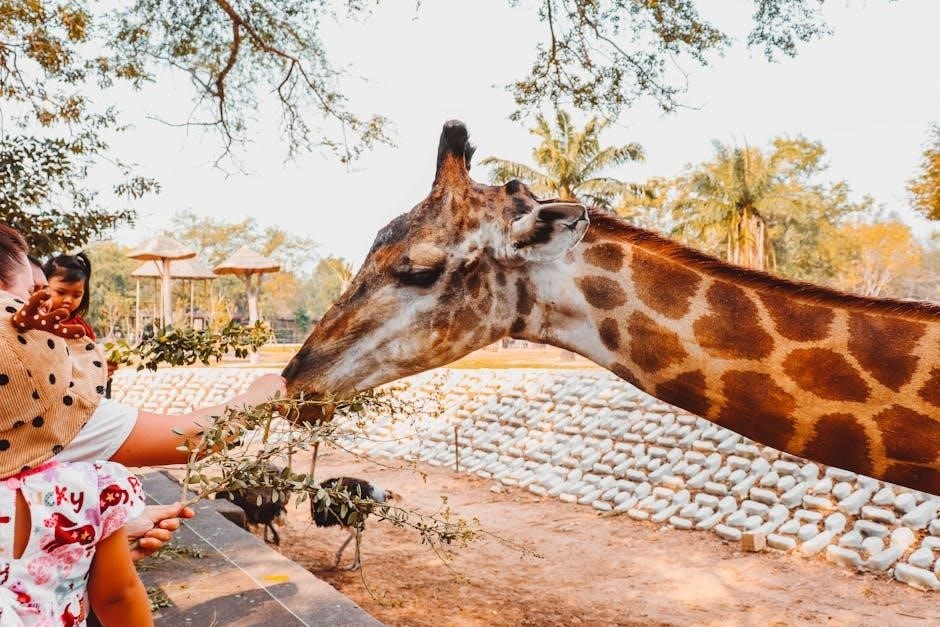
Post-Safari Follow-Up
Post-safari follow-up involves gathering feedback, improving services, and maintaining client relationships to ensure satisfaction and future bookings.
Gathering Feedback
Gathering feedback is crucial for improving safari tours. Guides collect insights through surveys, interviews, or online reviews to understand client experiences and identify areas for enhancement. This process helps in refining services, ensuring future tours meet expectations and exceed standards. By actively listening to feedback, guides demonstrate commitment to quality and client satisfaction, fostering trust and loyalty. Feedback also highlights strengths, allowing guides to emphasize positive aspects in marketing strategies. Regular feedback loops ensure continuous improvement, making each safari tour a better experience than the last.
Improving Services
Improving services is essential for delivering exceptional safari experiences. By analyzing feedback, guides identify areas needing refinement, such as enhancing safety protocols or enriching educational content. Implementing changes based on client insights ensures tours remain relevant and engaging. Continuous training for guides, updating equipment, and refining itineraries are common improvements. Regularly assessing service quality helps maintain high standards and adapt to evolving client expectations. These efforts not only boost client satisfaction but also strengthen the reputation of the safari tour company. Ultimately, improving services fosters loyalty and encourages positive word-of-mouth, driving long-term success in the competitive tourism industry.
Maintaining Client Relationships
Maintaining strong client relationships is crucial for safari tour guides to ensure repeat business and positive word-of-mouth referrals. Regular follow-ups after the tour, such as sending personalized thank-you notes or sharing photos, foster a sense of connection. Guides should stay in touch through social media or newsletters, offering travel tips or updates on wildlife conservation efforts. By showing genuine interest in clients’ experiences and satisfaction, guides build trust and loyalty. Consistent communication and engagement help maintain long-term relationships, encouraging clients to return for future safaris or recommend the service to others. This ongoing interaction not only enhances client satisfaction but also strengthens the guide’s professional reputation.

